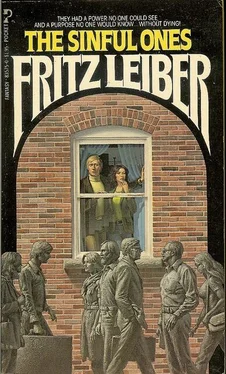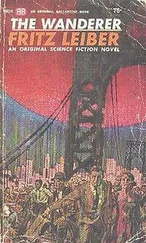“All right,” he said, “but first, Marcia, there’s something—”
The music ended with a flourish. Marcia gave him a little push. “Now run along and watch Keaton,” she said. “Oh, hello, Guy,” and the next moment her back was turned and she was talking with a lanky, graying Mr. Pendleton.
Miserably, Carr returned to the library, picking up a cocktail on his way. The discussions were still going full tilt. Keaton Fisher was now dominating one of them, timing his points to his tic.
Carr shuffled from the edge of one group to another, smiling and nodding approvingly at some of the remarks, but apparently just enough to get himself accepted without really being noticed. Everyone seemed to have concluded that he was just a vacuous sort of chap who wanted to wander around nursing a drink. He was conscious of a growing wall between him and all the others. A glass wall, perhaps, since it seemed to him that he could no longer hear so well what was being said—there was a humming in his ears.
Just then he noticed Keaton Fisher disappearing into the hallway. As if by magic his anxiety vanished and self-possession returned. Just as earlier he had been filled with relief to get away from Keaton Fisher, now he felt overjoyed at the prospect of getting back to him—anything, so long as it gave him something definite to do.
He veered for a moment toward the table of cocktails, then checked himself and walked straight to the study, pausing outside the door.
Keaton Fisher was inside and along. He had picked up a magazine and was studying the table of contents. He was facing away from Carr. He was motionless—except for the tic.
A childish play on words occurred to Carr, Keaton Fisher had a tic. Therefore Keaton Fisher was ticking. Like a clock.
Dark portraits of bearded men in last century’s clothes looked down on Keaton—masked men like himself who shrewdly eyed profits through the eyeholes in their faces. Carr felt a rush of anxiety and apprehension.
Staring motionless at the same page of the magazine, Keaton Fisher continued to tick.
Motionless—yet all at once he seemed to Carr to double in height, to become a terrifying figure in which was concentrated the quintessence of all the brasher and more predatory qualities of the noisy world around them—the world of out-thinking and out-smarting, come-ons and killings, ads and headlines, slaps and grabs, the world of the super-intelligent business-robots, of the hyper-efficient modern machine-men.
Keaton Fisher went on ticking.
For the moment everything was wiped from Carr’s mind except the question of whether or not to enter this room. He knew that he was faced with a decision that would effect his whole future life. He knew that, as happens much too often with such decisions, he was not making it, it was being made for him by forces stronger than any which consciousness could summon, but it was being made nevertheless.
Keaton Fisher still ticked.
With a little gulping sigh that was almost a whimper of fear, Car ducked back, darted to the cocktail table, drank one, picked up one, then another—he could pretend he was taking it to some woman—walked rapidly into the living room, edged along the wall past the dancers, opened the door to the dark sun porch, saw it was empty, sat down and began to drink in greedy little gulps.
When he put down the second glass beside his chair, reaction struck him a blow that made him writhe. He stared frantically at the dark windows with their reflected gleams of color from the dance floor. What he had done had shut him away from Marcia forever. This had been a last chance, a last test. It would be kidding himself to think differently.
He had scorned a splendid chance to make a real success in the world, a chance to push his head above the level of the nonentities, to clamber up to a level where you had some say about what happened to you.
He had doomed himself to lose his present job, to sneak away from his present environment, to go downhill for God knows how long, until the urges inside him gathered themselves for another try, if they still had the strength for that. Shame and vanity, he knew, would permit no other course.
But most of all, he had lost Marcia.
Perhaps it still wasn’t too late. Perhaps—
He jumped up, hurried back to the living room, sidled past the dancers, entered the study.
It was empty.
He looked in the library. He saw Keaton Fisher talking with some other people. Marcia looked happy, Keaton Fisher also seemed in expansive spirits. As Carr watched, he laughed at something and patted Marcia’s arm—just as his tic came.
Carr jerked back, hurried to the cocktail table, repeated his maneuver with the three drinks, and returned to the sun porch.
But now, as he drank in the darkness with the orchestra moaning behind him, there was a difference. Now that he had taken the irreversible step, or been pushed into it, he hated everything about the surroundings in which the step had been taken. Those idiots! What right had they to create a society in which brashness and machine-efficiency alone counted, in which the unambitious and fleshly-soft were tortured? Blind as bats to the truly important things in life. Jigging and hip-wagging like cogs and pistons while the world went God knows where. Sneering and jibing while time stole days from everyone and wouldn’t give them back. Fighting for crumbs of prestige, while unknown dangers, like black sea monsters, silently circled mankind’s vessel. For a moment Carr felt as if the Pendletons’ apartment were truly a ship, with only one poor drunken fool crouched futilely on the dark and empty bridge. He braced himself against the crash of the rocks.
Then, as the liquor tightened its grasp, another feeling came: optimism, or rather its blustering and uncertain ghost. Why the hell should he think he’d lost Marcia? Didn’t she love him? What difference did it make it she’d been trying to change his life and he wouldn’t let her? That just showed he was strong. He’d get her and take her somewhere else and they’d have some drinks and he’d explain everything to her. Tell her about the amnesia for one thing.
He threw open the door to the living room and strode across the dance floor just as the orchestra was starting a new number. He stared at faces. He didn’t care how rude he was. He just wanted to find Marcia.
Couples brushed him, but he did not move out of the way. What did he care for all these fools who so stupidly took no notice of him? For these pseudo-people who pretended not to notice a drunken man making a spectacle of himself! Smirking imbeciles! How he’d like to run amuck through them, knock down the men, rip the bright dresses off the women—especially those off-the-shoulder ones!
Then he saw Marcia.
She was on the other side of the dance floor, alone. He motioned urgently to her. Her eyes flashed past him with a smile.
She took some twirling steps, just by herself, as if to indicate how irresistible the music was. As she turned his way, he motioned again—an angry jerk of the forearm. But she ignored him.
Keaton Fisher danced past her with Katy Pendleton. Keaton called something to Marcia and she laughed.
She continued to twirl gracefully by herself—tauntingly, Carr felt. He grimaced at her and motioned a third time.
She smiled tantalizingly. Her arm seemed to rest on an imaginary shoulder, her back appeared to arch against an imaginary hand.
Carr thought she must be mocking him. It was as if she said, “This is fun. Don’t you wish you were here in my arms? Wouldn’t you give anything?”
And she kept it up, like an automation.
As if that thought had been a signal, all Carr’s feelings of the evening, his anxieties over Keaton Fisher, his agonies over his decision, his reactions to the whole Pendleton world, crystallized in one frozen instant of drunken awareness.
Читать дальше









